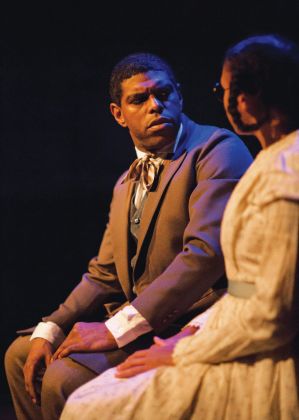
Virtually every culture includes in its folklore tales recounting the adventures of social misfits who forsake home and kin to roam the wide world, and in doing so, come to discover their place in the cosmos. The chief contribution of the North American variety is the significance of nature itself in the hero's journey to maturity. Peer Gynt and Lemuel Gulliver might observe alternative civilizations, but in a nation spanning an entire continent, the role played by wilderness primeval in precipitating mortals to contemplate their legacies is inevitable. That's what Rutherford’s Travels co-authors Ilesa Duncan and David Barr III see in Charles Johnson's “The Middle Passage" anyway. The results of their expertise is a thrilling page-to-stage — 400 pages and a 25 foot-by-20-foot stage, to be specific — yarn, narrated in story-theater fashion, drawing on classics like Huckleberry Finn and Moby Dick, while also referencing real-life events such as the Amistad uprising. It is 1830. Our restless soldier-of-fortune is Rutherford Calhoun, one of two brothers freed from slavery by a kindly, but filially biased, owner. After fleeing the family farm in Illinois for the port city of New Orleans, where he forges a career as a card sharp and pickpocket, Rutherford's bachelorhood is threatened by a bluestocking damsel determined to banish his wicked ways by marrying him. He escapes by stowing aboard an outgoing ship, only to discover that his getaway vehicle is bound for Africa, its goal to bring home a cargo of natives to be sold for slaves — not just any natives, but members of the much-feared Allmuseri tribe, said to possess occult powers. While at sea, Rutherford has an opportunity to observe a microcosm of society, all of whom exhibit the contradictions to be found in a complex and imperfect universe: even the cruel Captain Falcon must answer to merciless masters, and Rousseau's myth of the noble savage collapses beneath a prisoner insurrection. Rutherford comes to realize the importance of individual actions, vowing to find his peace on his own initiative. Though Pegasus Theater's cramped rental quarters at Chicago Dramatists cannot quite contain the spectacle this literary genre demands, Barr and Duncan's text is exemplary in its efficiency. Likewise praiseworthy is the ensemble led by Breon Arzell as the picaresque Rutherford (also featuring memorable character work by Ron Quade, Nelson Rodriguez, Gary Houston and newcomer Naima Hebrail Kidjo). When a play needs nothing more than a bigger room and budget, its future is auspicious.
